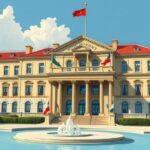Politics
ASIA, BANGLADESH, BASH, DEVELOPMENT, DHAKA, ECONOMIC COOPERATION, GUEST HOUSE, INTERNATIONAL RELATIONS, JAMUNA, JAPAN, MINISTRY, MINISTRY OF FOREIGN AFFAIRS, MUHAMMAD YUNUS, NORTH AMERICA, SALEHUDDIN AHMED, SK BASHIR UDDIN, THE BUSINESS STANDARD, TRADE, TRUMP, UNITED STATES, US, USA, USTR, WASHINGTON
Clara Montgomery
Bangladesh Strives to Boost U.S. Imports Amid High Tariff Negotiations
Bangladesh is moving to increase imports from the U.S. and address a 37% reciprocal tariff set to commence on April 9. Commerce Adviser Sk Bashir Uddin emphasized efforts to reduce the trade surplus and remove trade barriers. A series of inter-ministerial meetings will facilitate dialogue with U.S. authorities, focusing on compliance with USTR concerns and strategies to foster bilateral trade amid new tariff regulations.
Bangladesh aims to enhance its import of essential goods from the United States and reduce the existing trade surplus in response to the imposition of a 37% reciprocal tariff set to take effect on April 9, as announced by Commerce Adviser Sk Bashir Uddin. He noted that the government, led by Chief Adviser Professor Muhammad Yunus, plans to engage with U.S. authorities imminently to address and negotiate these tariffs.
Furthermore, steps will be taken to narrow the trade gap through increased imports and elimination of non-tariff barriers. Khalilur Rahman, a representative of the chief adviser, reassured journalists during a press briefing that a resolution is expected through thorough dialogue within a day or two. He emphasized Bangladesh’s initiative to contact the relevant U.S. authorities proactively, noting their previous acknowledgment of Bangladesh’s outreach.
An inter-ministerial meeting is scheduled, chaired by Finance Adviser Salehuddin Ahmed, to strategize regarding the tariffs. Senior officials from pertinent ministries, along with notable economists and stakeholders, will participate, underscoring the urgency this matter holds for Bangladesh’s economic relations with the U.S. Additionally, there will be a bilateral meeting with the U.S. Ambassador to discuss the implications of the new tariffs.
Lutfey Siddiqi, the chief adviser’s envoy for international affairs, highlighted recent USTR concerns regarding customs duties, intellectual property rights, and regulations, which align with the current government’s reform agenda. These issues are slated to be central topics during forthcoming tariff discussions.
A recent report indicates that approximately 30 items imported from the U.S. currently face elevated duties, including machinery and certain agricultural products, with tariffs ranging from 26.2% to 80%. Bangladesh typically imports major goods from the U.S., including cotton and aircraft, many of which enjoy duty exemptions. Despite wishes to reduce imports, officials from the National Board of Revenue (NBR) cautioned that any tax cuts must align with WTO regulations.
The government intends to actively remove import barriers as part of its reform strategy to foster bilateral trade. While the duty reductions are not feasible, there are efforts to boost imports from the U.S. the commerce adviser noted, emphasizing the importance of maintaining a balance in negotiations. Bangladesh’s data indicates that imports from the U.S. reached $2.53 billion in the fiscal year 2023-24, with significant contributions from sectors such as iron and steel, fuel, and cotton.
Despite the imposing tariffs, the commerce adviser conveyed confidence in the resilience of Bangladesh’s ready-made garment (RMG) industry and its ability to compete with other Asian nations, particularly highlighting proactive measures taken to ease cotton imports from the U.S. and adjust import policies accordingly.
Bangladesh believes these initiatives will offer a competitive advantage as it navigates the trade landscape.
In summary, Bangladesh is proactively seeking to increase imports from the United States and mitigate its trade surplus ahead of a new high tariff on exports. With planned strategic meetings and discussions on removing trade barriers, the government demonstrates its commitment to maintaining strong economic ties with the U.S. despite the challenges posed by recent tariff regulations. The focus remains on enhancing bilateral trade through increased imports and addressing concerns raised by the United States Trade Representative. Bangladesh’s robust RMG industry and proactive governmental engagement offer a framework for navigating these trade adversities and ensuring continued economic cooperation with its largest export market.
Original Source: www.tbsnews.net








Post Comment